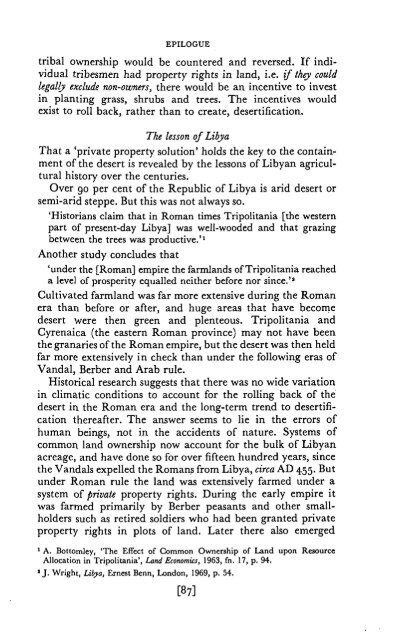THE MYTH OF SOCIAL COST.pdf - Institute of Economic Affairs
THE MYTH OF SOCIAL COST.pdf - Institute of Economic Affairs
THE MYTH OF SOCIAL COST.pdf - Institute of Economic Affairs
You also want an ePaper? Increase the reach of your titles
YUMPU automatically turns print PDFs into web optimized ePapers that Google loves.
EPILOGUE<br />
tribal ownership would be countered and reversed. If individual<br />
tribesmen had property rights in land, i.e. if they could<br />
legally exclude non-owners, there would be an incentive to invest<br />
in planting grass, shrubs and trees. The incentives would<br />
exist to roll back, rather than to create, desertification.<br />
The lesson <strong>of</strong> Libya<br />
That a 'private property solution' holds the key to the containment<br />
<strong>of</strong> the desert is revealed by the lessons <strong>of</strong> Libyan agricultural<br />
history over the centuries.<br />
Over 90 per cent <strong>of</strong> the Republic <strong>of</strong> Libya is arid desert or<br />
semi-arid steppe. But this was not always so.<br />
'Historians claim that in Roman times Tripolitania [the western<br />
part <strong>of</strong> present-day Libya] was well-wooded and that grazing<br />
between the trees was productive.' 1<br />
Another study concludes that<br />
'under the [Roman] empire the farmlands <strong>of</strong> Tripolitania reached<br />
a level <strong>of</strong> prosperity equalled neither before nor since.' 2<br />
Cultivated farmland was far more extensive during the Roman<br />
era than before or after, and huge areas that have become<br />
desert were then green and plenteous. Tripolitania and<br />
Cyrenaica (the eastern Roman province) may not have been<br />
the granaries <strong>of</strong>the Roman empire, but the desert was then held<br />
far more extensively in check than under the following eras <strong>of</strong><br />
Vandal, Berber and Arab rule.<br />
Historical research suggests that there was no wide variation<br />
in climatic conditions to account for the rolling back <strong>of</strong> the<br />
desert in the Roman era and the long-term trend to desertification<br />
thereafter. The answer seems to lie in the errors <strong>of</strong><br />
human beings, not in the accidents <strong>of</strong> nature. Systems <strong>of</strong><br />
common land ownership now account for the bulk <strong>of</strong> Libyan<br />
acreage, and have done so for over fifteen hundred years, since<br />
the Vandals expelled the Romans from Libya, circa AD 455. But<br />
under Roman rule the land was extensively farmed under a<br />
system <strong>of</strong> private property rights. During the early empire it<br />
was farmed primarily by Berber peasants and other smallholders<br />
such as retired soldiers who had been granted private<br />
property rights in plots <strong>of</strong> land. Later there also emerged<br />
1 A. Bottomley, 'The Effect <strong>of</strong> Common Ownership <strong>of</strong> Land upon Resource<br />
Allocation in Tripolitania', Land <strong>Economic</strong>s, 1963, fn. 17, p. 94.<br />
' J. Wright, Libya, Ernest Benn, London, 1969, p. 54.<br />
[87]












